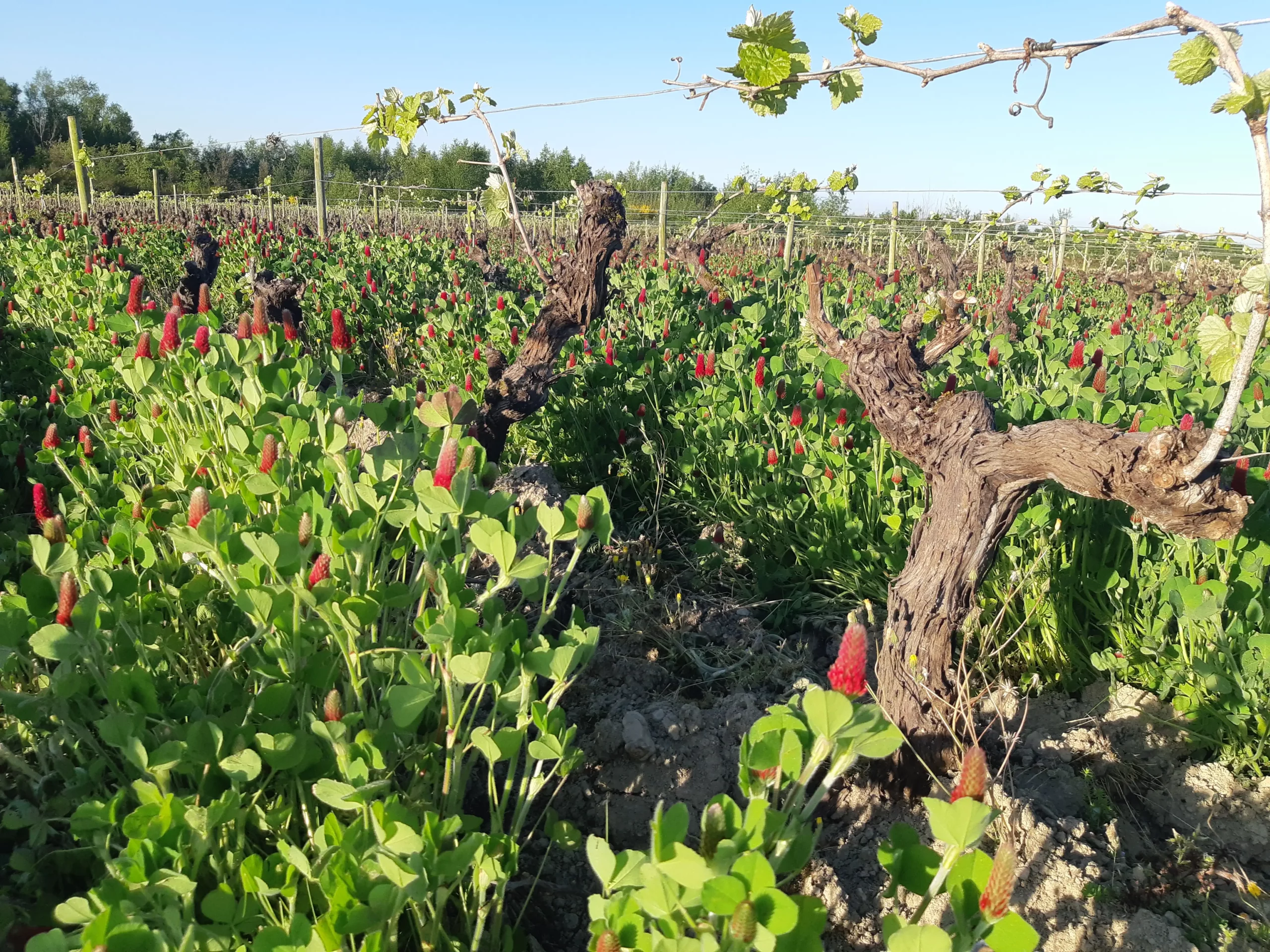Ecological pillar
Drawing inspiration from the way ecosystems function
to preserve the environment and resources
Living soil
With common sense and pragmatism, we reason our viticulture from the soil to the plant. This means making the greatest possible effort to maintain a living soil. One cm3 of soil contains several billion living organisms. Mushrooms, bacteria, earthworms and insects all contribute to the proper functioning of our soil, which we regard as a larder. We respect it as such by never ploughing it, by covering our vine rows with plant cover which is destroyed on the surface. They structure and aerate the soil, provide organic matter (food for the inhabitants) and protect it from the wind, sun and heat.
Finally, we regularly add calcareous marl to maintain a good chemical balance.
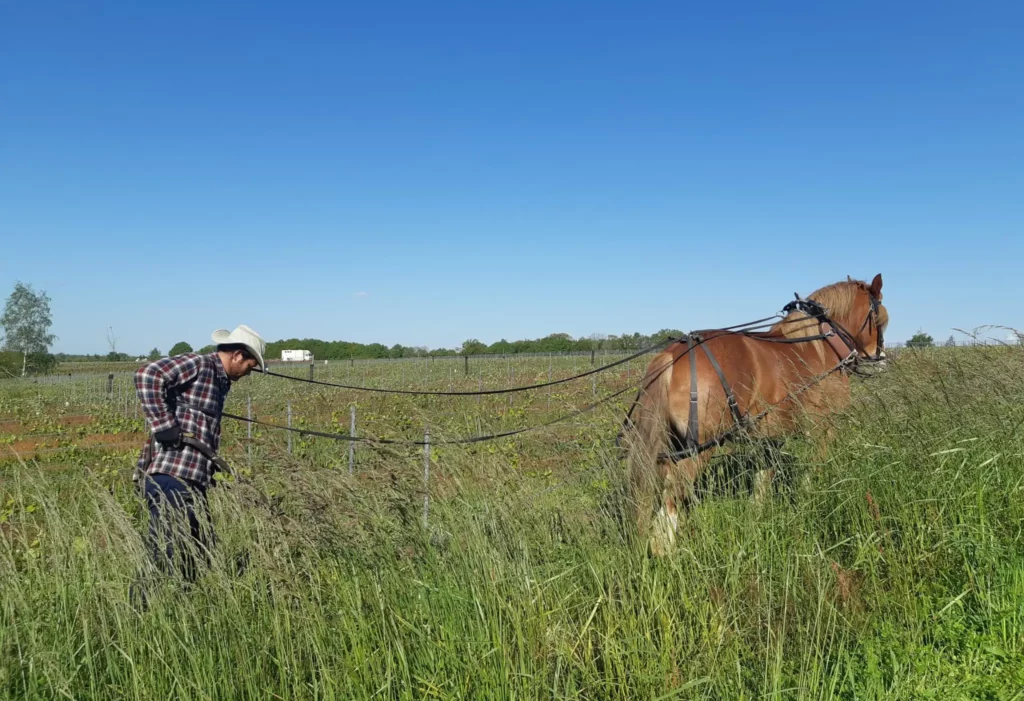
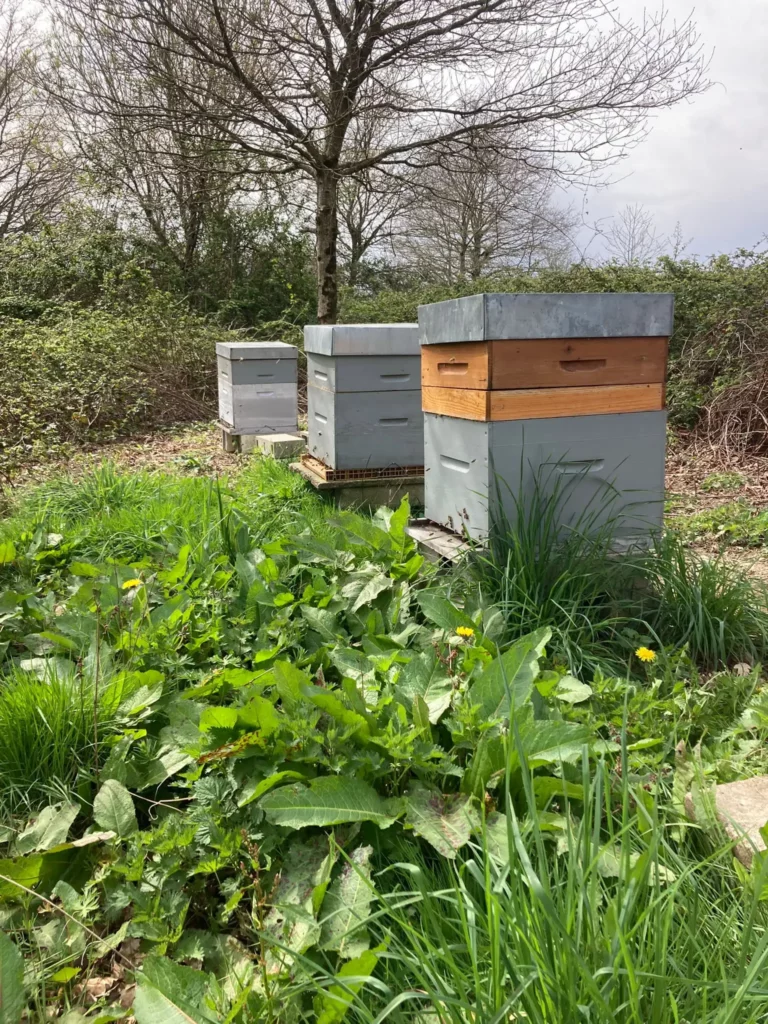
Encouraging biodiversity
Our plant cover is rich in melliferous plants: red clover, sweet clover, buckwheat and broad bean attract insects and, by extension, birds. Similarly, small mammals and reptiles populate our vines thanks to the food available and the habitat encouraged and preserved by our practices. Beehives set up on the edge of our plots also contribute to the vigour of the environment.
This biodiversity is also stimulated by the many trees on the estate. From the practice of agroforestry to the agro-ecological park encompassing woodland, copses, meadow strips, ponds and wild open spaces, trees are at the centre of our thinking and are our major asset for regulating the environment and absorbing climatic hazards as effectively as possible.
Our aim in promoting biodiversity is to maintain a healthy, balanced and resilient growing environment. Our vines sometimes face competition, but this strengthens their defences and their ability to adapt. We seek balance for our grapes, so that they are perfectly ripe at harvest time and reflect the terroir and the vintage.
Preserving water resources
The climatic context encourages us to consider water as an essential element of our agricultural system. Too much rain all at once, not enough in winter, summer drought, wet winter, etc. The water situation is far from linear.
We collect the rainwater that falls on our winery to carry out our treatments during the growing season.
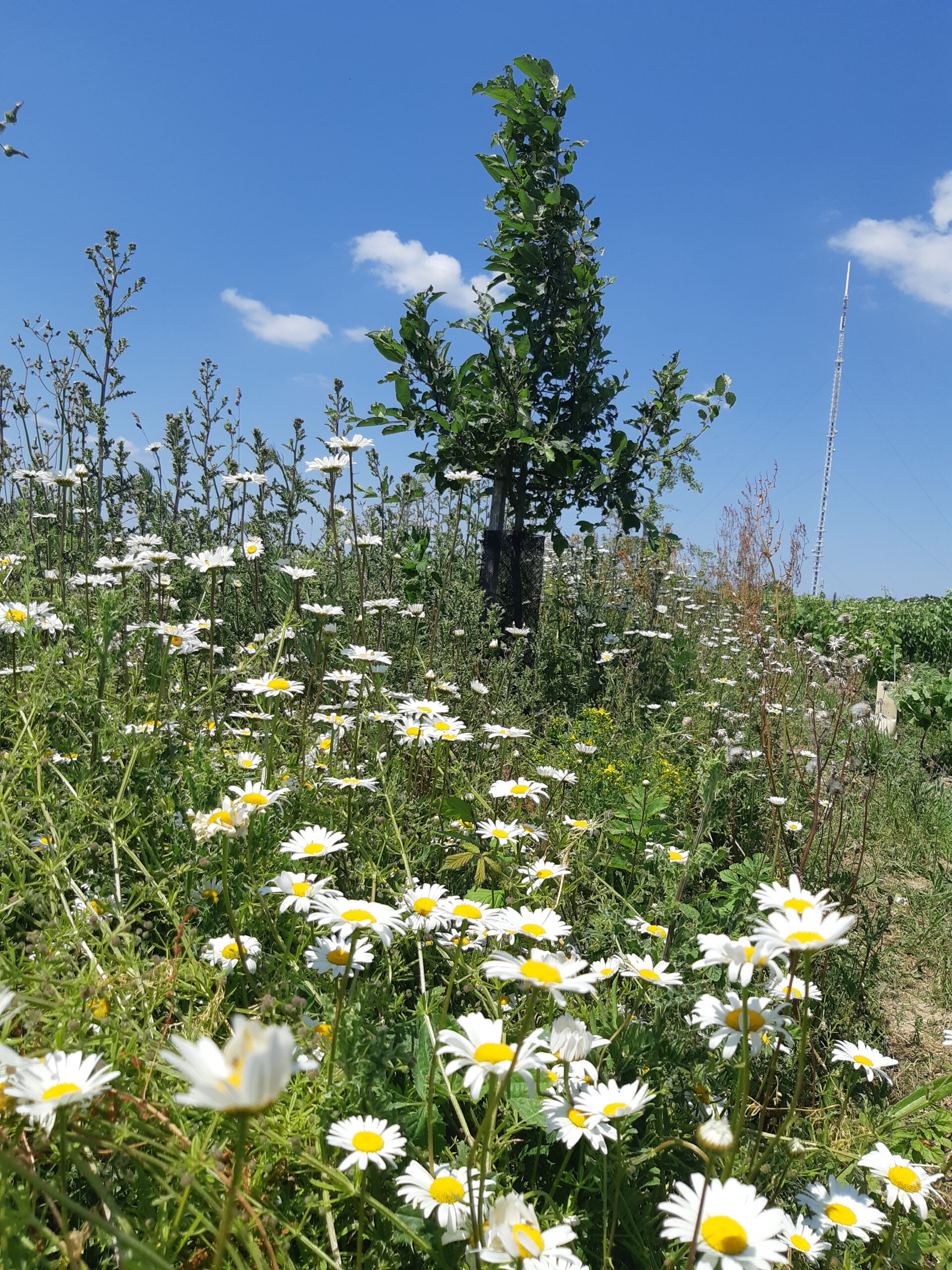
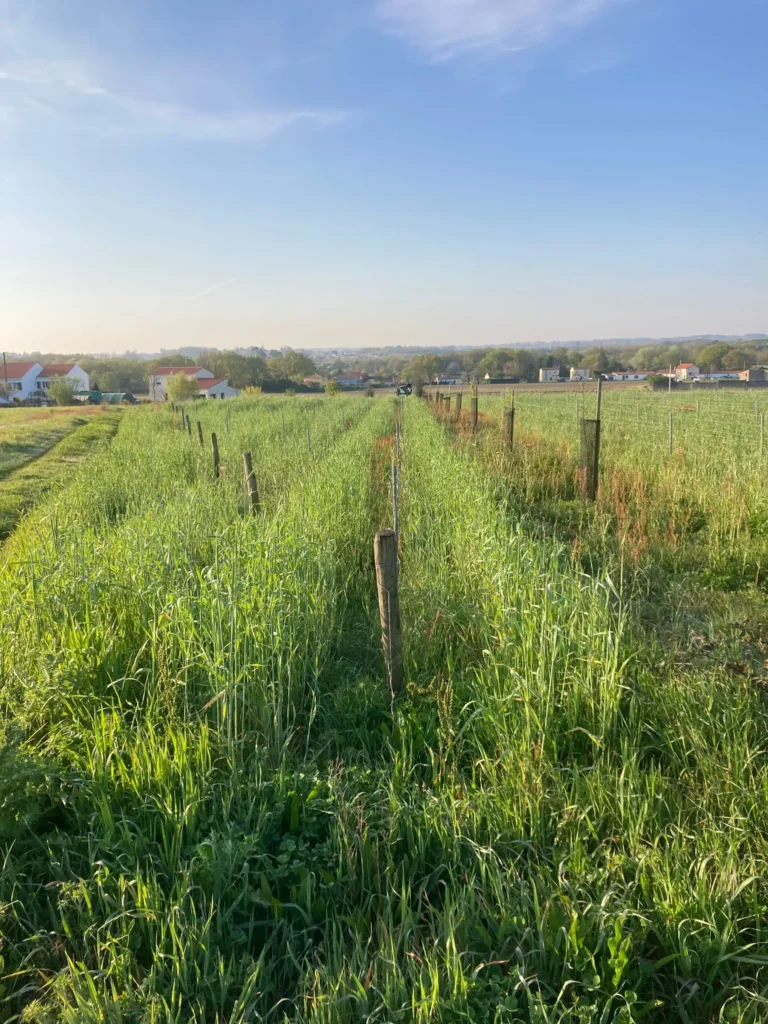
Our soils, which are covered and protected from intrusive mechanical work, are capable of absorbing water as it falls and storing it so that it can be released over time, as our vines need it.
Trees are also an invaluable tool for managing water resources. They structure the soil, allowing infiltration and capillary rise according to the needs of the crop.
Energy sobriety
Our agro-ecological practices enable us to store 240% of our carbon emissions for the production of our grapes in the soil. However, we are constantly thinking about how to optimise our energy consumption. Our agricultural work is rational and economical, in terms of the number of operations and the tools we use. Our tractors consume very little fuel, and we use horse-drawn vehicles to reduce our consumption even further.
Finally, elbow grease is a remarkable way of reducing consumption! Pickaxes, hoes, spades, rakes and backpack sprayers are our everyday tools.
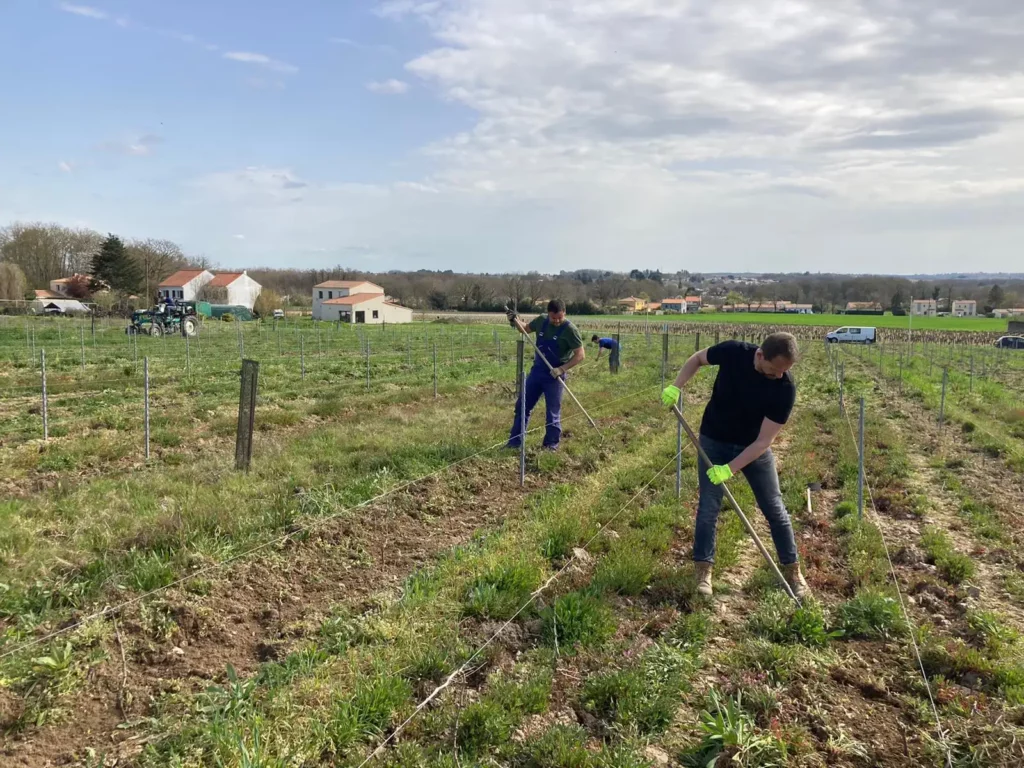
Economical pillar
Reclaiming an inclusive economy serving the common good
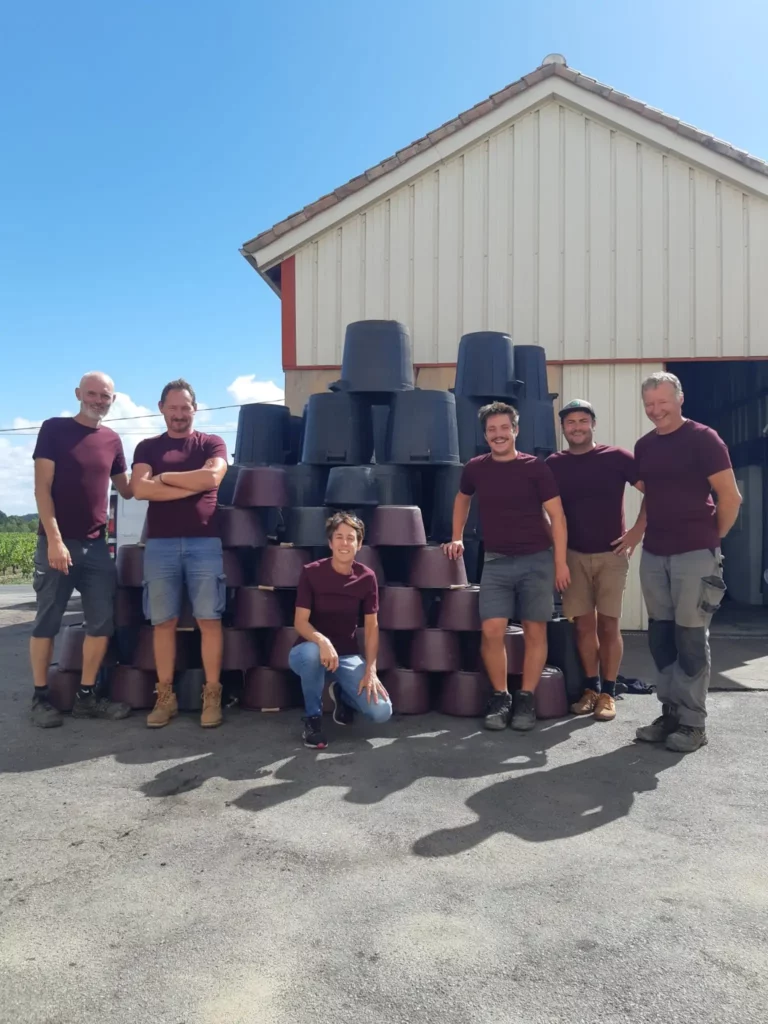
Local employment
Our approach is global and sustainable. We give priority to human and artisanal work, which shapes the landscape and maintains our estate. We welcome many students on work placements, who are always fully involved and help us to move forward and think things through. Our team is close-knit and close-knit, always ready to meet the challenges of day-to-day work and long-term projects.
A sustainable estate
All our practices are part of a sustainable approach. And on our scale, sustainability has to be economic. Whether it’s a question of developing our business by offering high-quality products, or paying our employees as well as we can, but also of taking pleasure in giving our time and energy to tending the vines and making our wines, our aim is to build a viable estate, i.e. one that has what it takes to last.
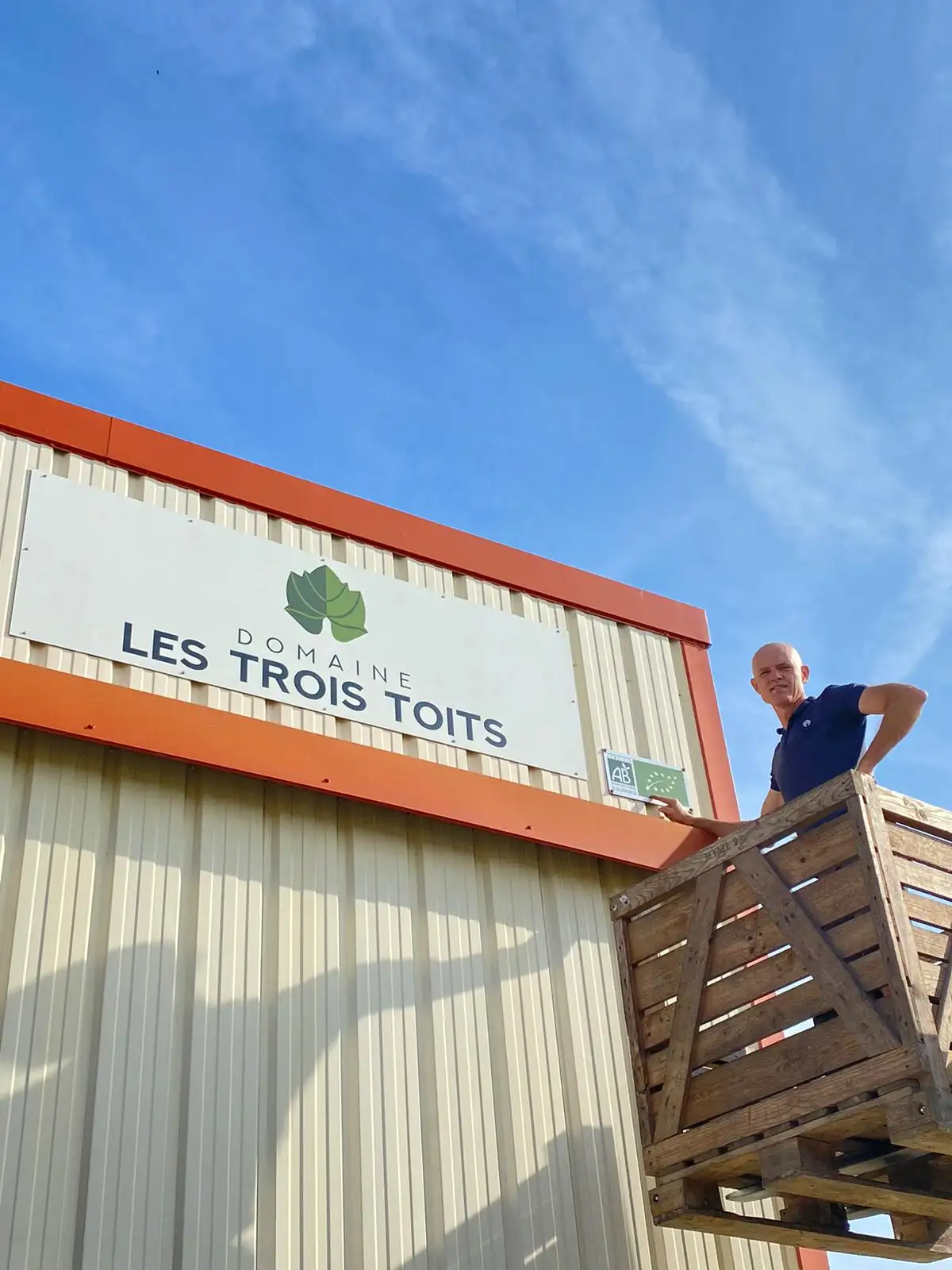
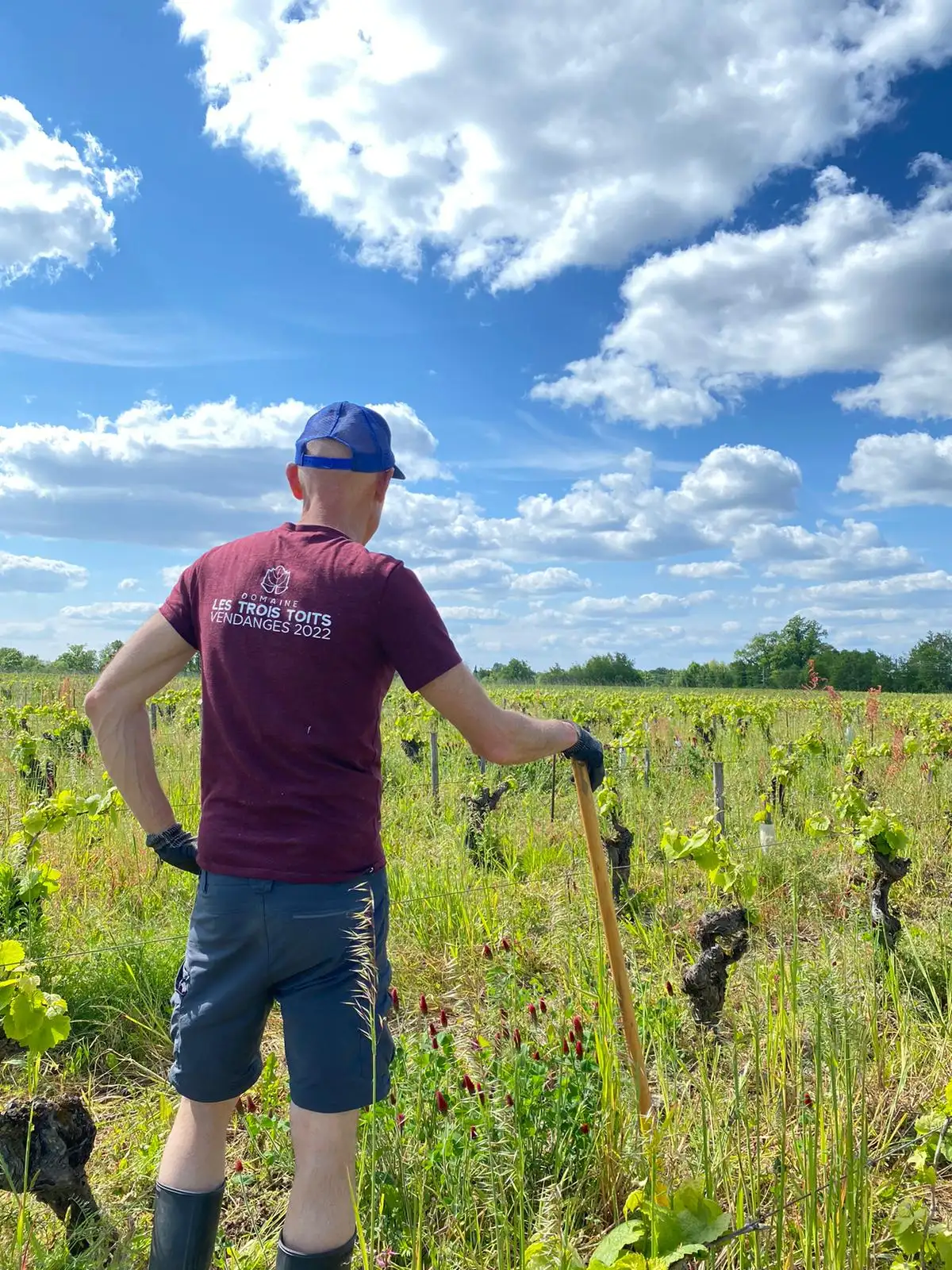
Social pillar
Cultivating solidarity and social responsibility through an ethical and supportive approach
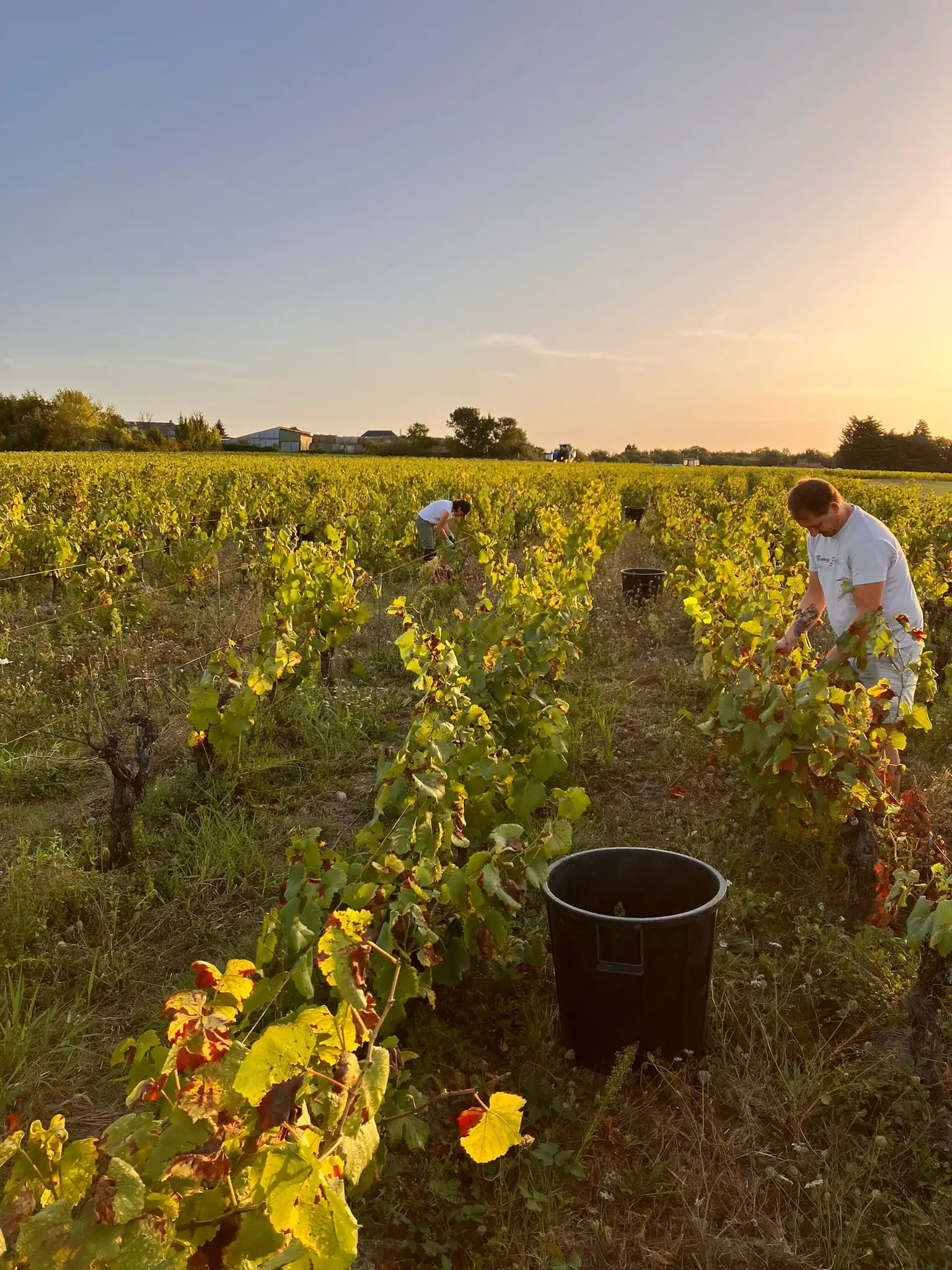
Small-scale farming on a human scale
Our practices are far from revolutionary, but they sometimes make our neighbours, walkers and professionals sit up and take notice. Yet we are guided by good farming sense, based on observation, consultation, listening and exchange. We take part in regular training courses, focus groups and technical bodies. We plan our plots so that they make sense: orientation, grape varieties, pruning.
Sharing skills and knowledge across the board
The whole of the estate’s team is involved on a daily basis in the issues surrounding our committed viticulture. Weed and plant cover management, the plants used in our sprays, gentle pruning, the maintenance of complants, etc. Every action must make sense to everyone. Decisions are discussed and taken with the help of everyone’s input and skills.
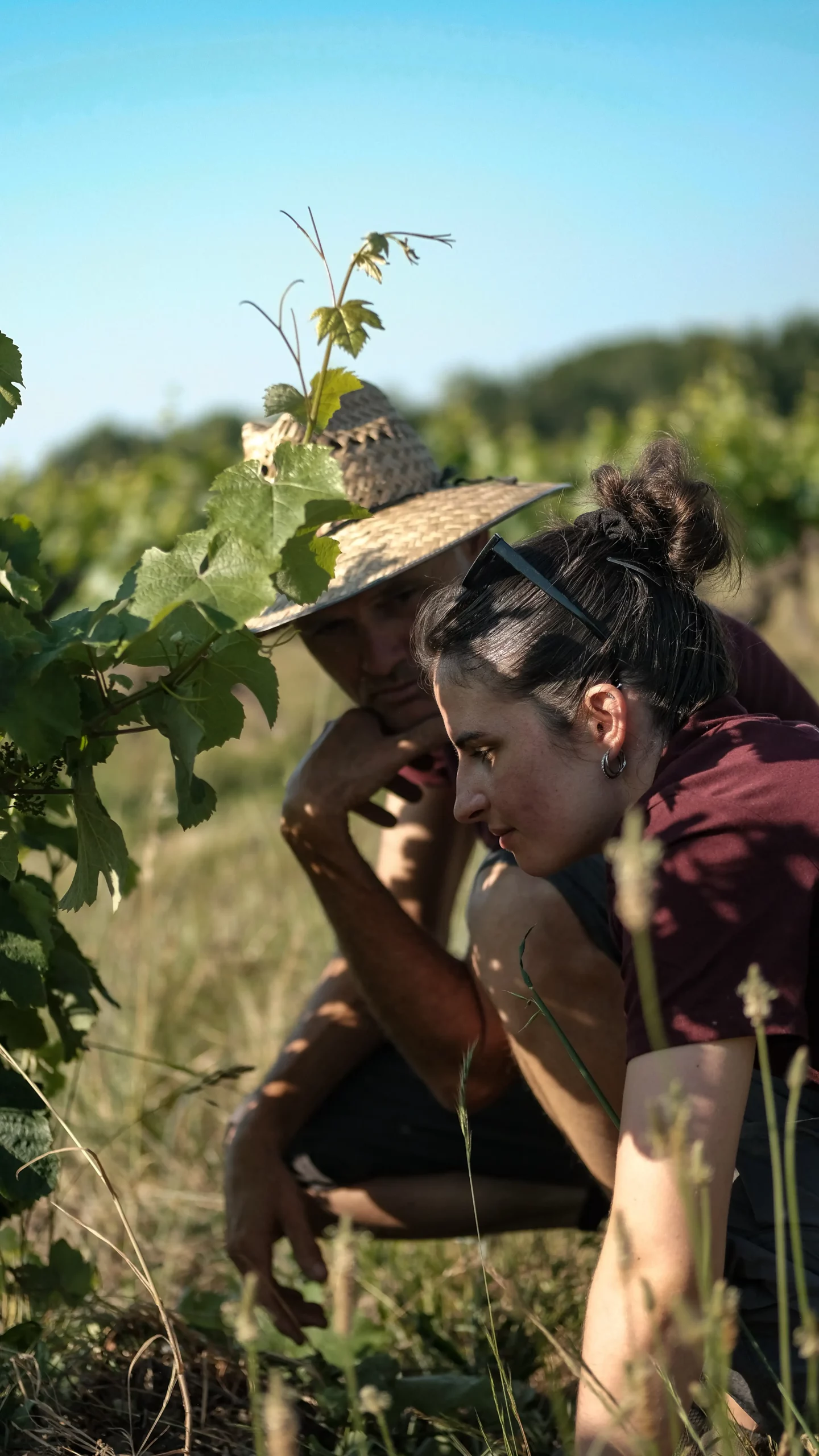
Follow us
on Instagram !
Every time we meet you, we share some news about the estate and its development. On a weekly basis, we communicate on social networks, aiming to deliver content that allows readers to understand a little more about the story behind each bottle of wine.
🇫🇷 L’été approche à grands pas… Il est temps de remplir vos caves pour la saison !
Le Domaine Les Trois Toits vous présente sa sélection "Jardin", idéale pour vos apéros et dîners estivaux.
Des vins pensés pour le plaisir : faciles à déguster, accessibles, et surtout délicieux bien frais
Dans cette sélection :
Rooftop - notre muscadet de plaisir, souple et minéral, idéal pour un verre en toute simplicité
La Plage – un blanc fruité et rafraîchissant, parfait pour vos dîners d`été
La Folle Blanche - le bon plan, frais et zesté, qui sublime apéros, fruits de mer et crustacés
Red Hot – un rouge souple à servir légèrement frais, au top avec grillades et charcuterie
📍 Disponibles en vente directe au caveau
📦 Et pour les amateurs éloignés : commandez sur notre boutique en ligne et recevez vos vins d`été directement chez vous !
🇺🇸 Summer is fast approaching... It`s time to fill your cellars for the season!
Domaine Les Trois Toits presents its selection "Jardin", ideal for your summer aperitifs and dinners.
Wines designed for pleasure: easy to enjoy, affordable, and above all delicious chilled.
In this selection :
Rooftop - our muscadet of pleasure, supple and mineral, ideal for a simple glass.
La Plage - a fruity, refreshing white, perfect for summer dinners
La Folle Blanche - a fresh, zesty wine for aperitifs, seafood and shellfish.
Red Hot - a supple red to be served slightly chilled, top with grilled meats and charcuterie
📍 Available for direct sale at the cellar
📦 And for wine lovers far away: order from our online store and receive your summer wines direct to your home!
#lestroistois #vertou #winemaker #vigneronindependant #domaineviticole #agriculturebiologique #naturalwine #vinsnaturels #vindenantes #muscadet #agricultureresponsable @les_extra_terrestres

🇫🇷 Le compte à rebours est officiellement lancé… ⏳
Nos ceps sont en pleine effervescence : les grappes se forment, les fleurs s’épanouissent, et la vigne embaume l’air à l’approche de l’été.
Dans le vignoble nantais, une règle d’or guide les vignerons : 90 jours après la fin de la floraison du Melon de Bourgogne, c’est l’heure des vendanges.
Autant dire que le millésime 2025 est déjà en marche.
🇺🇸 The countdown has officially begun...
Our vines are bursting with life: grape clusters are forming, flowers are blooming, and the vineyard is filled with the scent of summer approaching.
In the Nantes vineyard, winemakers follow a golden rule: 90 days after the Melon de Bourgogne finishes flowering, it’s harvest time.
In other words, the 2025 vintage is already on its way.
#lestroistois #vertou #winemaker #vigneronindependant #domaineviticole #agriculturebiologique #naturalwine #vinsnaturels #ceps #agricultureresponsable @les_extra_terrestres

🇫🇷 Quand la vigne s`élance, la terre se prépare.
Alors que nos vignes poussent à toute allure, il est important pour nous de bien les accompagner dans leur développement.
En agriculture biologique, cela passe par un travail du sol continu, qui permet d’éviter la pousse de plantes invasives tout en respectant la biodiversité de nos terroirs. Les tracteurs deviennent alors un élément indispensable !
Plusieurs instruments permettent à nos vignerons de passer entre les rangs pour gratter et retourner la terre, à la fois entre les ceps et entre les rangs. Ça secoue un peu, mais ça fait du bien quand même 😉
🇺🇸 The vine take the lead and the soil plays its part.
As our vines grow at full speed, it’s important for us to support them properly through their development.
In organic farming, this means continuous soil work, which helps prevent the growth of invasive plants while respecting the biodiversity of our terroir. Tractors then become an essential ally!
Several tools allow our winegrowers to move between the rows, scratching and turning the soil both between the vines and between the rows. It shakes things up a bit, but it feels good all the same. 😉
#lestroistois #vertou #winemaker #vigneronindependant #domaineviticole #agriculturebiologique #naturalwine #vinsnaturels

🇫🇷 Là où le vin mûrit, les œuvres aussi prennent vie.
Nos portes s’ouvrent et nos murs accueillent l’univers de Jean Fléaca, qui dessine, peint et écrit sur papier, carton ou toile. Par son approche singulière et raffinée, il mêle images, mots et objets avec une sensibilité rare, faisant de lui une figure à part dans le monde des plasticiens-poètes.
De précis assemblages témoignent ici des rêveries « Plain-Chant » de ce promeneur singulier en pays de vignes sur le temps qui passe et les saisons qui changent.
Ouverture de l`exposition le samedi 24 mai en présence de l`artiste à partir de 11h00.
📍 Domaine Les Trois Toits
51 rue du Champ de Pie - 44120 Vertou (La Nicolière)
🇺🇸 Where wine matures, art also comes to life.
Our doors open and our walls welcome the world of Jean Fléaca, who draws, paints, and writes on paper, cardboard, or canvas. Through his unique and refined approach, he blends images, words, and objects with rare sensitivity, making him a distinctive figure among visual artist-poets.
Carefully crafted assemblages here bear witness to the ""Plain-Chant"" reveries of this singular wanderer in wine country, reflecting on the passage of time and the changing seasons.
Exhibition opening on Saturday, May 24th, with the artist present from 11:00 AM.
#lestroistois #vertou #winemaker #vigneronindependant #domaineviticole #agriculturebiologique #naturalwine #vinsnaturels #chai #exposition #exhibition #art
📍 Domaine Les Trois Toits
51 rue du Champ de Pie - 44120 Vertou (La Nicolière)"

🇫🇷 La vie suit son cours au Domaine Les Trois Toits 🌿.
Plantées il y a à peine trois semaines, nos jeunes pousses profitent pleinement des doux rayons du soleil printanier, et leurs premières feuilles commencent déjà à émerger.
Les cépages Villard, Selenor, Abouriou, ainsi que le traditionnel Melon de Bourgogne, s’épanouissent peu à peu dans le parc agroécologique de La Ville au Blanc, en pleine transformation et porteur de promesses pour des cuvées d’exception.
🇺🇸 Life goes on at Domaine Les Trois Toits.
Planted just three weeks ago, our young shoots are taking full advantage of the mild spring sunshine, and their first leaves are already beginning to emerge.
The Villard, Selenor and Abouriou grape varieties, as well as the traditional Melon de Bourgogne, are gradually blossoming in the agro-ecological park of La Ville au Blanc, which is undergoing a complete transformation and holds great promise for exceptional vintages.
#lestroistois #vertou #winemaker #vigneronindependant #domaineviticole #agriculturebiologique #nantes #cepages #villeaublanc #agricultureresponsable @les_extra_terrestres @vertou

Subscribe to our newsletter !
In addition, we create a newsletter, which we publish 5 times a year, to share our news with those of you who prefer to sit back and read.
Enjoy your reading, stay tuned and keep in touch.

